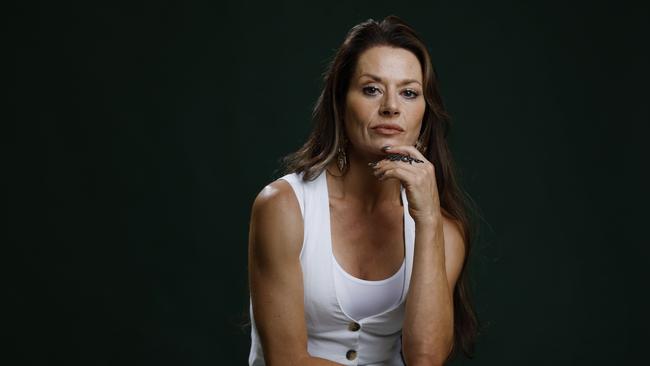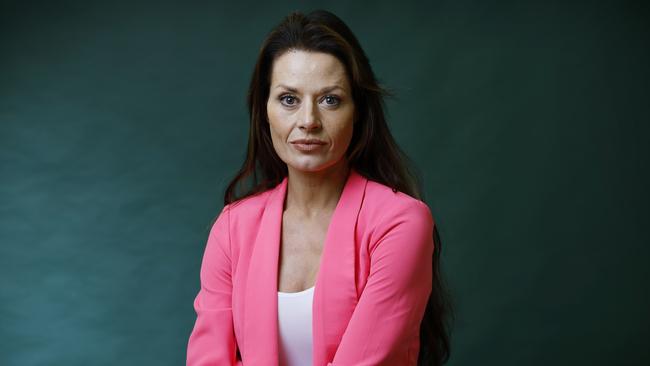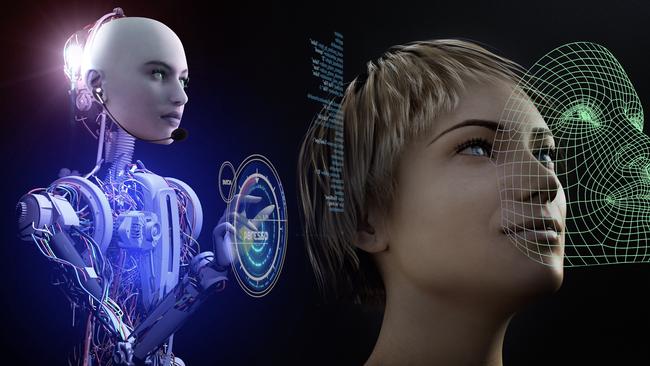It immediately transformed my smiling selfie into a shockingly realistic nude deepfake
The former Neighbours star warns how deepfakes are on the rise, sharing how her selfie was turned into a ‘shockingly realistic nude’ in seconds.

Lifestyle
Don't miss out on the headlines from Lifestyle. Followed categories will be added to My News.
Recently I “sampled” a generative image-based AI app. It immediately transformed my smiling selfie into a shockingly realistic nude deepfake.
I didn’t need to sign in or create an account. Doing so would have unlocked a smorgasbord of naked body options, contorted in sexual acts and poses. As a consenting grown woman, I was shocked, embarrassed.
But for a teen to have their image graphically manipulated without their consent, then dispersed among their online community would be catastrophic, the emotional and psychological impact traumatic and long lasting.
Just last month 50 girls, between years 9 and 12 at Bacchus Marsh Grammar in Victoria, had pictures of their faces artificially doctored to generate explicit images.
These were circulated on Snapchat and Instagram, resulting in the arrest of a teenage boy, and a future of fear, embarrassment and shame for the girls involved.
This is not a rare occurrence. As an educator in schools for Safe on Social, I’m receiving similar disclosures every week.


Deepfake technology makes artful use of artificial intelligence to create fake, but realistic, digitally manipulated videos and images. Any clear, preferably forward-facing picture will do. When created without the consent of the individuals depicted, we enter the grey area between art and exploitation. This technology goes hand-in-hand with the steep rise in “sextortion”, a hybrid term combining sex and extortion.
It describes online blackmail where perpetrators coerce victims into providing explicit images, engaging in sexual acts or sending them money under threat of the compromising material being shared with friends, family, or the public.
It can play out on any communication-based online platform, and can affect anyone: children and teenagers being most vulnerable.
Sending an explicit picture seems unthinkable, until you drill down into the tactics. Perpetrators catfish victims with false identities; hackers access sensitive information; while phishing schemes trick victims into revealing personal details or login credentials. Sextortionists pose as authority figures or, most chillingly, weaponise AI to create defamatory deepfakes for blackmail or “revenge porn”.
Recognising these methods amplifies the dangers and encourages caution in online interactions because ignorance breeds complacency, until it’s too late.

The Barefoot Investor, Scott Pape, recently chronicled the heartbreaking story of 16-year-old sextortion victim Mac, who took his life as a result.
We may scoff at the notion of sending a nude pic, but the scale of the problem tells us we are doing just that. Now, with the advent of easily generated AI nudes all it takes is one clear shot of your face on FB or LinkedIn for you to fall victim.
Targeting a social-media-saturated teen is frighteningly simple. A recent case we advised on involved a 14-year-old boy catfished by what appeared to be a girl he knew from a neighbouring school when she “slid into his DMs”.
The account was fake, composed of a series of screenshot posts from the actual girl’s public account, with a matching handle – except for an additional underscore, subtle enough to go undetected.
In this guise, the sextortionist began conversing with the boy, confessing a crush, requesting a picture of his abs, responding with images cropped from a porn site.
Asked for one which showed his dimples, the boy sent a full nude image, at which point the sextortionist demanded $5000 or the pic would be released to the boy’s online community. Sending all he earned across the next few weeks the panicked boy finally confided in Mum, who reached out to us having attended a parents’ session.
We reported the behaviour to Instagram and to the Australian Centre to Counter Child Exploitation, and beyond getting a slap on the wrist for foolhardy behaviour, the boy received no punishment, just counselling, and lots of support. The extortionist, on the other hand, was promptly exposed and prosecuted.

Prevention requires awareness, and spotting potential threats before they escalate. Don’t post photos of your kids on public pages, and ask their permission regardless. The best way to empower kids to take ownership of their body and their experience is to acquaint them with saying “No”.
Set all accounts to private, get a password manager and multi-factor authentication.
Should you need to provide a professional snap of yourself, avoid forward-facing, symmetrical portraits. The more asymmetric the pose, the harder it is to deepfake.
Receiving unsolicited friend requests or messages from strangers is a red flag, particularly those who immediately engage in intimate conversation.
Never agree to move conversations to private messaging platforms, or share personal information or explicit images, particularly if requested to prove you like this online “friend”.
Note if your child exhibits behavioural changes like social withdrawal, falling grades, lethargy, anxiety, depression and irritability. Note increased secrecy, changing passwords or hiding their devices. Slinking into the bathroom or bedroom with device in hand is a red alert.
Sleep disturbances, changes in eating habits, and unexplained physical ailments like headaches or stomach-aches are common alarms. Vigilance is a virtue, trust your instincts.
In Australia, sextortion and non-consensual deepfakes have significant legal consequences. Technology is evolving much faster than legislation designed to keep it safe, but existing penalties are severe. Sections 474.17 and 474.25 of the Criminal Code Act 1995 punish this behaviour with up to three years’ jail time, rising to 15 years if the image is deemed child exploitation material.
Additionally, The Criminal Code Amendment (Deepfake Sexual material) Bill 2024 “bans the sharing of non-consensual deepfake explicit material, imposing up to seven years’ imprisonment”.

For teens, penalties include diversion programs or juvenile detention, but if the image features a naked child, someone performing a sexual act, is in the presence of someone performing a sexual act, or posing in a sexual manner (as seemingly innocent as twerking in a bikini in the bathroom mirror) penalties can include juvenile detention and placement on the sex offender registry.
Teens and their guardians can also be sued for defamation. Ruined reputations attract heavy damages claims.
For parents, you may also be held legally liable, and ordered to undergo education to better manage your child’s digital activities.
Simply put, kids will be kids. Dabbling in inappropriate behaviour online is just kids doing what kids have always done: taking risks.
The rites of passage my generation survived, within the relative security of our immediate community seem as redundant as Atari. Our kids’ online “village” is populated by thousands, witnessing them fumble towards adulthood.
Growing up digital fosters an illusion of broad connection, yet in real life we’ve never been more disconnected, and the risks are all too real.
The future is digital. Now is the time to remind the next generation that everything they do online is there FOREVER.
Guide them to curate a digital footprint reflecting the incredible person they are striving to become, not the person their peers dictate they should be.
They can be heroes – tell them their online behaviour needs to reflect their heroism now. Because no self-respecting superhero needs anyone dredging up a TikTok of them twerking in the bathroom mirror in their undies.
Please … before it’s too late.
West works as an adviser for Warriors Advocacy, which helps survivors who have been sexually abused by family members and in the community, and women who have suffered domestic violence. For those who have been affected or need support, you can reach out to Warriors Advocacy.
More Coverage
Originally published as It immediately transformed my smiling selfie into a shockingly realistic nude deepfake




